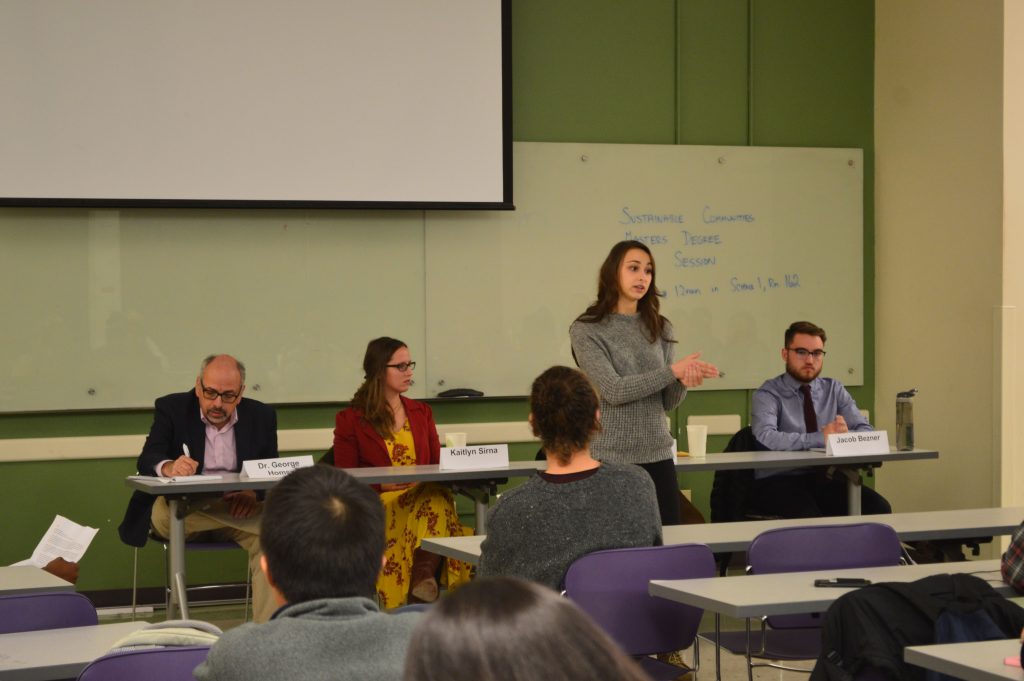
Student environmental activism in the greater Binghamton area was the topic of discussion at the “Securing a Green Future: Environmental & Food Justice Panel” on Wednesday night. The panel analyzed the lack of widespread student engagement in the Downtown Binghamton community while addressing the possible means for increasing it.
The panel was hosted by Intellectual Decisions on Environmental Awareness Solutions (IDEAS) and The New York Public Interest Research Group (NYPIRG). Ava Glasser, a member of IDEAS and a junior majoring in environmental science, said that food justice is a particularly pressing issue in the community.
“We want to address food justice as it applies to environmental racism and issues of economic inequality,” Glasser said. “This issue is of extreme importance to the Binghamton area, and is also a growing problem worldwide.”
The panel featured George Homsy, assistant professor of public administration and a director of the master’s in sustainable communities program; Robert Holahan, professor in environmental and political science departments; Kaitlyn Sirna, a manager at Volunteers Improving Neighborhood Environments, a nonprofit dedicated to developing community food systems; and Jacob Bezner, a sophomore double-majoring in history and political science and treasurer of the Roosevelt Institute.
Panel members discussed the relation between environmental issues on Binghamton University’s campus and Downtown. According to Sirna, both areas face water-safety issues, food deserts and river flooding.
In order to effectively combat these issues, Sirna emphasized the importance of involving citizens in their own community changes.
“[Volunteers Improving Neighborhood Environments] employs 16 to 20 at-risk youth in the city of Binghamton for six weeks during the peak of the summer, and teaches them about agriculture,” Sirna said. “We help them see they can be advocates of change in their own community.”
Homsy emphasized the interconnectedness of environmental progress and social justice, and the danger of leaving a burden on low-income people.
“We must protect the environment, as long as it is not on the backs of disadvantaged people,” Homsy said. “You can say you want to use better insulation in homes, but who is going to pay for it?”
Bezner discussed his interest in fixing the lack of student participation in environmental action.
“There tends to be a bubble that most BU students stay in once they get here,” Bezner said. “I want to bridge the the gap between students and the Binghamton community.”
Keanna Julien, a second-year graduate student studying sustainable communities, said she wants to inspire other students to take part in combating food injustice.
“I came out because I am interested in environmental stability in communities and connecting students to go Downtown and fight for these issues,” Julien said. “I want to express to students that it’s cool to care about the environment, and compel those with power to make the changes we want.”
BU student participants articulated particular concern for the prevalence of plastic water bottles on campus, as well as the plastic containers in the Marketplace. The panel expressed a sentiment that if enough student activism occurs, change may be seen on campus.
Homsy expressed said environmentalism is crucial is to the success of BU, as is the need for the administration to act on students’ calls for actions.
“We need to be on the cutting edge of these environmental innovations because we are competing for the best students,” Homsy said.
The panel ended on a note of the application of environmentalism to attendees’ lives, and the importance of making these options available to all members of society.
“Each of us need to find a way to make a difference within the meals we eat because this issue is much bigger than Binghamton,” Sirna said. “The goal should be to make it easier for everyone to do the right thing.”
Sen Mabry, a member of NYPIRG and a junior majoring in political science, said he felt the panel was a success.
“We think the panel will lead to a lot more Downtown involvement and BU campus involvement related to environmental activism,” Mabry said.


